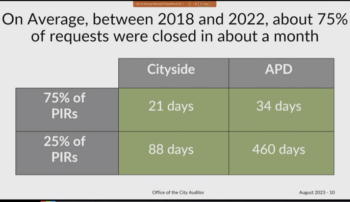
The City Council’s Audit and Finance Committee spent less than 20 minutes this morning listening to and discussing a presentation by the City’s Audit Manager Patrick Johnson.
Council Committee members hearing the briefing were Chair Alison Alter, Vice Chair Leslie Pool, Mackenzie Kelly, and Ryan Alter. Vanessa Fuentes was absent.
Johnson presented a brisk overview of an 18-page draft audit of City’s responses to public information requests (PIRs), which concludes there’s a need “to adopt a more proactive and consistent approach to providing public information.”
The audit objective was to determine if the City follows open records laws and provides information in a timely and efficient manner.

Deputy City Attorney Deborah Thomas said the staff is in agreement with recommendations and is forming a team to address the issues raised in the audit.
Basics of the City’s process
The Texas Public Information Act, aka Government Code Chapter 552, establishes the public’s right to obtain information about its government agencies, but also requires that some information be protected from release.
Members of the public can request public information from the City of Austin via email to [email protected], hand delivery, or through a website that uses GovQA software and accommodates requests to either the Austin Police Department or all other City departments (Cityside).
Each department has one or more employees designated as single points of contact (SPOCs) who receive requests, then collect, redact, and release relevant information to the public through the GovQA portal.
Requestors are sent an email notice when information is available, and must log in with an email and password (or create an account if they’re first-time users) to download it.
Overview of findings
The audit identified a need for more consistent training of the employees who process requests and better tools for redacting information that by law is prohibited from release.
The audit states the City is not proactive in posting fulfilled PIRs, frequently requested information, or information related to incidents of public intererst. Doing so would enhance the public’s access to information and reduce the need to file PIRs.
The audit reviewed public information websites for 10 other cities and found that 60 percent of those posted PIR-related information online. The City of Austin is not using a “trending topics” page for that purpose that’s part of the GovQA software system.
The City maintains an Open Data Portal but a survey of previous requestors showed that only 40 percent were satisfied with the amount of information posted. Requestors noted that information was often not what they were looking for or was outdated.
Online information about the PIR process is available only in English, despite the fact that 31 percent of residents speak a language other than English at home, and more than 11 percent speak English less than very well.
PIRs must be filed in writing but how a request is written can greatly affect the City’s response. The audit states the City can provide better transparency by engaging with requestors and helping them write better PIRs.
 Between 2018 and 2022, the APD received 82,134 PIRs, while all other city departments (called “Cityside”) received 39,278 PIRs. The audit states, “Based on current staff, the Cityside allocates about 20 times more staff to process about half the requests as compared to APD.”
Between 2018 and 2022, the APD received 82,134 PIRs, while all other city departments (called “Cityside”) received 39,278 PIRs. The audit states, “Based on current staff, the Cityside allocates about 20 times more staff to process about half the requests as compared to APD.”
Searches for PIRs asking for electronic records depend on key words, which tools are used to find results, and who does the search. The City does not have consistent guidance on this.
When it comes to redacting information, 66 percent of SPOCs reported the need for additional training to identify the exceptions that require withholding information from release. APD staff members do not have the specialized tools needed to redact information from audio and video files.
Audit recommendations and implementation plans
The audit provided four recommendations and management agreed to each one.
Centralize management of all City public information requests to improve consistency of the city’s approach. By October 2023, a Joint Leadership Team will provide a single set of operational protocols, guidance, and training.
Devote adequate resources including staff and tools to fulfill public information requests promptly in accordance with applicable laws. A new text redaction tool has been acquired and tested, and will be provided in September. A review of all processes will be completed in January 2024.
Address internal processes by creating a standard operating procedure (SOP), train staff in using the SOP, monitor department performance, develop a plan to eliminate the APD backlog, and post the SOP publicly. These actions are to be completed between October 2023 and June 2024.
Manage public information to improve the user experience with the City’s public information request website, provide tips on how to write a request, and include a tool to translate information about the process into multiple languages. Explore the use of chatbot and links to data sets. Identify and post frequently requested information on trending topics. This is to be implemented by June 2024.
This article was updated 9:15am August 24, 2023, to correct the statute citation for the Texas Public Information Act and Deborah Thomas’s title: she is the deputy city attorney.
 Trust indicators: Ken Martin has filed more than a thousand public information requests since founding the Bulldog in 2009—most of them with the City of Austin. He was represented by attorney Bill Aleshire in successfully suing the City of Austin twice in 2011 to obtain public information being improperly withheld. One of those lawsuits went to the Third Court of Appeals and resulted in a decision that personal email addresses that public officials use for public business cannot be withheld (redacted) when releasing those messages in response to a public information request (Case No. 03-13-00604-CV).
Trust indicators: Ken Martin has filed more than a thousand public information requests since founding the Bulldog in 2009—most of them with the City of Austin. He was represented by attorney Bill Aleshire in successfully suing the City of Austin twice in 2011 to obtain public information being improperly withheld. One of those lawsuits went to the Third Court of Appeals and resulted in a decision that personal email addresses that public officials use for public business cannot be withheld (redacted) when releasing those messages in response to a public information request (Case No. 03-13-00604-CV).
You can reach him at [email protected].
Related documents:
Office of the City Auditor’s Audit Report on Public Information Responses, August 2023 (18 pages)
Case No. 03-13-00604-CV, Texas Court of Appeals, Third District, at Austin (16 pages)
Judgment Rendered by Third Court of Appeals April 8, 2016 (1 page)
Related Bulldog coverage:
Big win for public’s right to know, April 11, 2016







